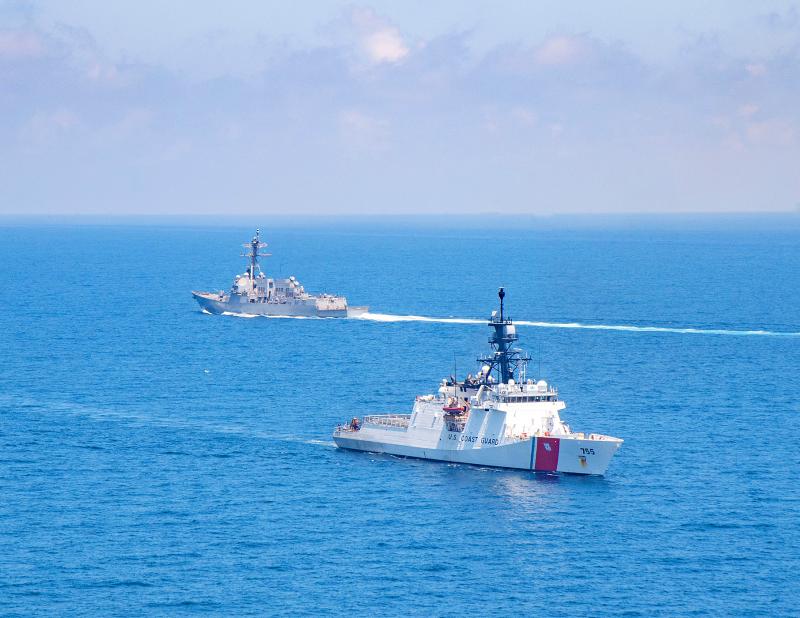During meetings with US counterparts in the past few months, Chinese military officials repeatedly said that the Taiwan Strait is not within international waters, generating concern in Washington, a person familiar with the matter said.
The statement, which disputes the US interpretation of international law, has been delivered to the US government by Chinese officials on multiple occasions and at multiple levels, the person said.
The US and key allies routinely send naval vessels through the waterway as part of freedom of navigation exercises, with the view that much of the strait is in international waters.

Photo: Reuters
China has long asserted that the Taiwan Strait is part of its exclusive economic zone, and takes the view there are limits to the activities of foreign military vessels in those waters.
Although China regularly protests US military moves in the Taiwan Strait, the legal status of the waters had never previously been a talking point in meetings with US officials.
It is not clear whether the assertions indicate that China might take further steps to confront naval vessels that enter and transit the Taiwan Strait.
The US also conducts freedom of navigation operations in the South China Sea to challenge Chinese territorial claims around disputed land features.
“The United States will continue to fly, sail and operate wherever international law allows, and that includes transiting through the Taiwan Strait,” Pentagon spokesman Martin Meiners said.
During a speech on Saturday at the IISS Shangri-la Dialogue in Singapore, US Secretary of Defense Lloyd Austin said that China was unilaterally attempting to change the “status quo” regarding Taiwan.
“Our policy hasn’t changed,” Austin said. “But unfortunately, that doesn’t seem to be true for the PRC [People’s Republic of China].”
“We’re seeing growing coercion from Beijing,” Austin told delegates at the security forum. “We’ve witnessed a steady increase in provocative and destabilizing military activity near Taiwan. That includes PLA [China’s People’s Liberation Army] aircraft flying near Taiwan in record numbers in recent months, and on a nearly daily basis.”
Austin’s speech was followed on Sunday by Chinese Minister of National Defense General Wei Fenghe (魏鳳和), who repeatedly expressed Beijing’s willingness to fight to prevent a formal split by the democratically elected government in Taipei.
Wei did not explicitly refer to the legal status of the Taiwan Strait.
“If anyone dares to secede Taiwan from China, we will not hesitate to fight,” Wei said, reaffirming Beijing’s longstanding position on the dispute. “We will fight at all costs, and we will fight to the very end. This is the only choice for China.”
The Mainland Affairs Council said in a statement on Sunday that Wei’s public threatening of the nation at an international event proved Beijing was the source of regional disturbance, calling his comments “tantamount to a declaration of war.”

US President Donald Trump said "it’s up to" Chinese President Xi Jinping (習近平) what China does on Taiwan, but that he would be "very unhappy" with a change in the "status quo," the New York Times said in an interview published yesterday. Xi "considers it to be a part of China, and that’s up to him what he’s going to be doing," Trump told the newspaper on Wednesday. "But I’ve expressed to him that I would be very unhappy if he did that, and I don’t think he’ll do that," he added. "I hope he doesn’t do that." Trump made the comments in

Japanese footwear brand Onitsuka Tiger today issued a public apology and said it has suspended an employee amid allegations that the staff member discriminated against a Vietnamese customer at its Taipei 101 store. Posting on the social media platform Threads yesterday, a user said that an employee at the store said that “those shoes are very expensive” when her friend, who is a migrant worker from Vietnam, asked for assistance. The employee then ignored her until she asked again, to which she replied: "We don't have a size 37." The post had amassed nearly 26,000 likes and 916 comments as of this

Tourism in Kenting fell to a historic low for the second consecutive year last year, impacting hotels and other local businesses that rely on a steady stream of domestic tourists, the latest data showed. A total of 2.139 million tourists visited Kenting last year, down slightly from 2.14 million in 2024, the data showed. The number of tourists who visited the national park on the Hengchun Peninsula peaked in 2015 at 8.37 million people. That number has been below 2.2 million for two years, although there was a spike in October last year due to multiple long weekends. The occupancy rate for hotels

A cold surge advisory was today issued for 18 cities and counties across Taiwan, with temperatures of below 10°C forecast during the day and into tonight, the Central Weather Administration (CWA) said. New Taipei City, Taipei, Taoyuan and Hsinchu, Miaoli and Yilan counties are expected to experience sustained temperatures of 10°C or lower, the CWA said. Temperatures are likely to temporarily drop below 10°C in most other areas, except Taitung, Pingtung, Penghu and Lienchiang (Matsu) counties, CWA data showed. The cold weather is being caused by a strong continental cold air mass, combined with radiative cooling, a process in which heat escapes from